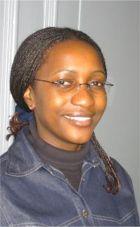
Gaudencia Mutema compares different integration experiences among the Rwandan refugees in Zimbabwe and in Bergen. She emphasises the significance of religion in the lives of the refugees. Many interviews have been conducted and many things have made a powerful impression. Now the large job of finishing the thesis remains.
Family planning in Zanzibar
Some of the students are finished. They have completed their master degrees. - The way masculinity and femininity are constructed, combined with religion, is an obstacle for family planning and reproduction health. Halima Shamte found this after studies in Zanzibar and she has accounted for this in her master thesis. Gender relations are a hindrance for the use of contraceptives. Men have to be involved more closely in the work for reproduction health, Shamte thinks, since they have the last word to say about sexuality and reproduction.
Birth registration in Bangladesh
Since 1875 Bangladesh has had laws on birth registration. But they have not functioned. Births have not been registered to any degree. Now the government, in cooperation with UNICEF, is in the process of introducing a universal birth registration system in the country. This is to protect the human rights of children since it provides the possibility of proving identity and age - something that is especially important for girls. Birth registration will also make public planning easier. Lise M Østby has interviewed parents, health workers and representatives for volunteer organisations and the government - and she found that most people were positive towards this new project. So it should finally be possible to implement the laws from 1875.
Old age in Malagasy
Old age is often studied in a North American or European context. Gerontology narrows the focus on old age to the psychological or biological aspects of it. But aging is also a socio-cultural process, Geir Tonstøl thinks. Studies within the Malagasy society are his contribution to widening the perspective. There, aging implies being ray aman'dreny, something that means 'father and mother' translated to English. Having achieved this provides status. Tonstøl's study examines the elderly's role and status in society and everyday life, with a special focus on interaction with the young. And he investigates what significance gender has in relation to ray aman'dreny.
Children in Malagasy
Cathrine Evans has studied how children in poor families in Malagasy handle one of the parents being hospitalised for a lengthy illness such as tuberculosis. The custom is that the family, usually the spouse, has to care for the patient while hospitalized. At this time the children are usually left to fare for themselves. How do boys and girls adapt to this? What tasks do they do, what roles do they take on? Cathrine Evans asks in her master thesis.
Fishermen and fishmongers in Lake Victoria in Uganda
Marianne Yayi Kajokaya has studied fishermen and fishmongers in Lake Victoria in Uganda. The fishing industry in the area has gone through huge changes in connection with ecology, modern technology and globalisation of the market for fish. In her study she attempts to understand the relationship between fishermen and fishmongers - from a gender perspective. The women have taken the step into the fishing industry. They buy boats - and do some of the jobs which only men did earlier. At the same time they do some of the women's jobs. By partaking in the fishing industry, the women become more independent in their business dealings and enhance their status in society as such, Marianne Yayi Kajokaya believes.
Feminism in Africa
Gender models and/or models for development which African aid programmes are based on, are to a too large degree based on perspectives from the west, and to a too small extent on African history, experiences and values, Fredrik Kindi Immanuel thinks. The result is that development has been development for men - since most of the programmes are organised to fit Africa into the capitalistic model characteristic for the west. In this way Africa is at risk of losing its cultural individuality, and the possibility of African feminism building on African women's history becomes pure trickery. He recommends that knowledge and wisdom be sought in Amartya Sen's thoughts. Here an alternative is offered both for women's development - and for the development of Africa, Fredrick Kindi Immanuel thinks.
HIV and AIDS in Tanzania
Vendelin Simon has written about how local culture and tradition should be used in the work on preventing HIV and AIDS (follow link above to the right to read article).
Do you want to know more about the master theses? Contact Janne B Bøe, at The Centre for Women and Gender Research at the University of Bergen. janne.boe@skok.uib.no